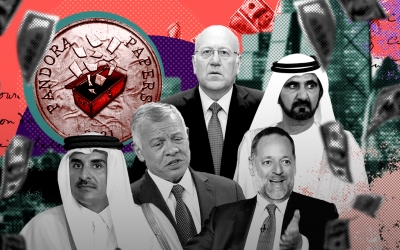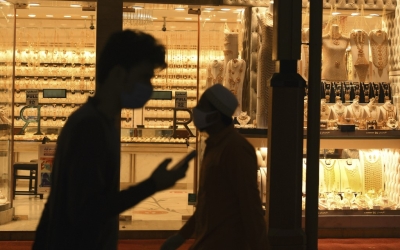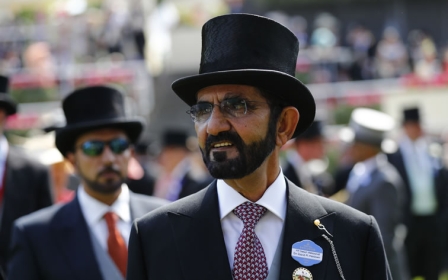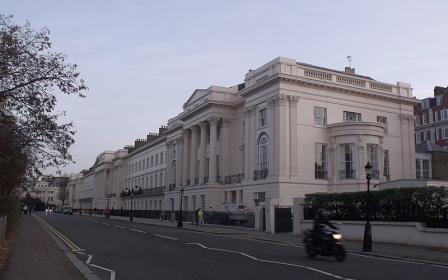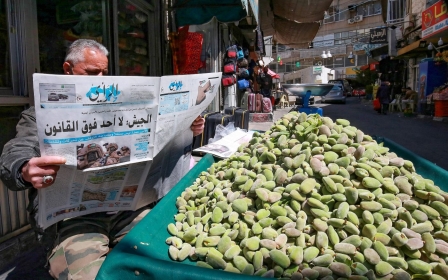Pandora Papers: How London became a financial hub for Gulf rulers and the super-rich
Since leaving the European Union, the British government has looked to boost its image at home and abroad with a series of public relations exercises, including the "Britain is Great" advertising campaign, designed to "promote British creativity and innovation to foreign investors".
What goes unsaid is the great talent the United Kingdom has developed since the end of World War Two, of serving as a money laundering hub, tax haven and facilitator of global finance.
It is a position that Britain and its satelites have consolidated since the country's decline following the messy retreat from empire.
The foundations of the structures used by political elites and the super-rich in the Pandora Papers to evade taxes and scrutiny were however formed much earlier, during the British empire itself, and involved the Middle East.
In 1876, British courts ruled that a company should be taxed only in the country where the company is controlled, enabling a distinction between a company’s registration and where it operates.
This was the start of dual-taxation agreements, where a company essentially chose where it is taxed, which was invariably where tax was lower.
It was a case involving the Egyptian Delta Land and Investment Company that first used this loophole, which some have argued “made Britain a tax haven”. In 1929, a court ruled that the company, which was registered in the UK and had moved its board to Egypt, would not pay tax in the UK.
Britain’s own form of banking secrecy was also developed during empire - the trust fund, where the beneficial owner (the actual owner of an asset) is not publicly declared.
“Trusts are legacies of British colonialism, existing in many forms in former colonies, either enacted during imperial rule or after, when the UK had influence in how legislation and laws were developed,” says Rachel Etter-Phoya, senior researcher at the UK-based Tax Justice Network (TJN).
Britain’s role as an enabler for tax evasion and financial secrecy went into overdrive following the Suez crisis in 1956, when the UK was in retreat on the world stage and the United States was in its ascendance militarily and economically.
The City of London Corporation re-positioned its imperial financier role to become a global financial market, including for illicit financial flows, the profits of resource extraction, and petrodollars.
Spider's web
“The City of London has a whole different set of rules to the UK, and has a spider’s web of satellite havens from the Cayman Islands to Jersey that feeds the City. It is Britain’s second empire,” says Etter-Phoya.
When formal colonisation ended, Britain remained a key player in the financial markets in enabling dirty money - or money that should have been taxed elsewhere - to flow through it.
“It is hypocritical as Britain preaches about good governance, and provides development aid to the Middle East, but at the same time it is enabling those countries and others to move money offshore, especially political elites, which the Pandora Papers shows,” says Etter-Phoya.
The UK’s former colonies and dependencies are central to how this spider's web functions. Britain sits at the centre of the network, with outposts scattered around the world in places that were once part of the empire.
According to TJN, the UK accounts for 16 percent of the global market in offshore financial services. If TJN’s Corporate Tax Haven (CTH) Index 2021 scores of British territories - assessed as the contribution they make to total global financial secrecy - are added in, it is 22 percent of the world total.
It was a case involving the Egyptian Delta Land and Investment Company that some have argued 'made Britain a tax haven'
Furthermore, as the State of Tax Justice 2020 reports, the UK spider’s web is responsible for over 49 percent of the $182bn in tax the world loses to private offshore tax evasion every year, costing the world over $90bn in lost tax.
Including London, seven of the top 15 jurisdictions in the CTH Index are overseas territories or crown dependencies, where the Queen is the head of state, and five are former colonies.
Hong Kong, Singapore, the UAE, Ireland, and Cyprus are independent, but the financial system and regulations are still deeply interconnected with London.
In the TJN Financial Secrecy Index, five out of the top 10 are also connected to Britain: the Cayman Islands, Hong Kong, Singapore, the British Virgin Islands (BVI) and the UAE.
“These financial centres all duplicate British common law. The Dubai model is taken from the UK model,” says Lakshmi Kumar, policy director at Global Financial Integrity (GFI).
In addition to historical ties, geographical proximity plays a role. “If you look at the US, it attracts a lot of Latin American money, which you don’t really see making its way to London. There are these geographical and historical influences on the patterns of money laundering we see, and how finance moves across the world,” says Kumar.
The UK-linked hubs have come up time and again as being havens for money laundering, tax evasion and the hiding of ill-gotten gains of kleptocrats, as noted in the Panama Papers and the Pandora Papers, which includes a slew of Arab politicians and wealthy individuals that used tax havens.
The British Virgin Islands have played a particularly prominent role. “The BVI, Jersey, and all these overseas territories link back somehow to London. Nearly always there’s a BVI case in the Pandora papers. No matter where you are in the world, the BVI is the middle-man destination,” says Kumar.
All the Middle Eastern leaders referenced in the Pandora Papers had companies in the BVI: the emir of Qatar, Lebanese prime ministers and Jordan’s King Abdullah. “That is telling, and speaks volumes to its reputation, and how far it has spread,” says Kumar.
BVI companies were used to purchase real estate in the UK and elsewhere, with the true ownership unknown until the leak of more than 11.9m confidential files to the International Consortium of Investigative Journalists (ICIJ).
The Middle East connection
As the empire crumbled, London focused on the oil-rich Gulf kingdoms, being a region in which it could continue to exert influence and drum up business.
While Saudi Arabia was formed in 1932, the Trucial States - the UAE, Qatar, Bahrain - only got independence much later, in 1971, the same year Kuwait, which had become independent in 1961, took control of its foreign affairs, which had until then been overseen by London.
“British banks were in there very early, and do retain a degree of cache because of the City of London,” said Andrew Feinstein, executive director of Shadow World Investigations.
As part of their transition to independence, the Gulf states’ security would be ensured by London, in return for oil exports and petrodollars flowing to the City, as well as sizeable arms deals, which were often shady, like the Al Yamamah deal.
Arab investors and elites were encouraged to invest in London real estate, while taking advantage of the British capital's financial system and trust funds.
“The vast majority of the MENA leaders had assets in the UK, and the UK authorities have been extremely efficient and competent at ignoring them,” said Feinstein.
Following the Arab Spring in 2011, it was revealed that the ousted Egyptian President Hosni Mubarak had luxurious London properties, and Libyan leader Muammar Gaddafi’s son Saadi owned a £10m house in Hampstead.
The Dubai nexus
While Britain has retained its allure as a safe haven for stashing wealth and to anonymously buy properties, Dubai has carved out a position for itself, which has directly and indirectly benefited from its historical ties with London.
“Dubai and London are in competition and cooperation, as in some ways they feed off each other. Look at financial institutions, they have a significant presence in both places, and do inappropriate activities in the best location for that activity. The primary difference with Dubai is it is fairly new to the game,” said Feinstein.
While Dubai copied the London model, others are following suit, with British assistance. Kazakhstan, another oil rich country, is trying to turn the capital Astana into a financial hub.
“It is getting British lawyers and former judges to create that centre, and make Astana the Dubai of that region. Much like the UAE, it is a centre of business but also a centre for the migration of questionable finance and capital,” says Kumar.
This article is available in French on Middle East Eye French edition.
Middle East Eye delivers independent and unrivalled coverage and analysis of the Middle East, North Africa and beyond. To learn more about republishing this content and the associated fees, please fill out this form. More about MEE can be found here.


